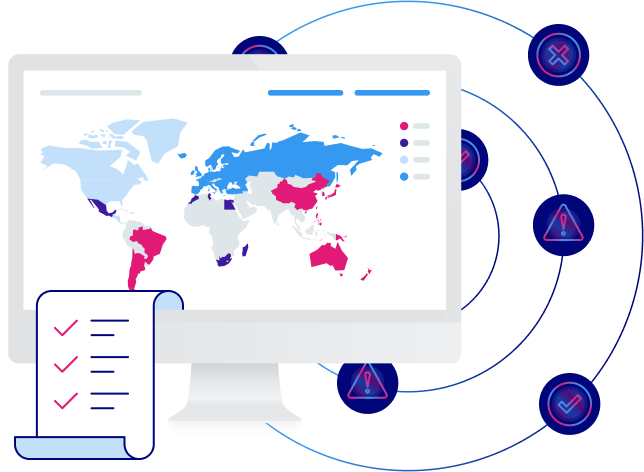-
Solutions
- AI Governance
- Responsible AI
- Geo-Specific Cookie Banner
- Consumer Preference Management
- Data Subject Request Automation
- Data Mapping and Vendor Risk Management
- Migrate
- Privacy, Vendor, and Risk Assessments
- Privacy Program Management
- Regulatory Guidance
- Privacy Program Consulting
- Certifications and Verifications
- International Data Transfers
Forrester TEI ROI of Privacy ReportTrustArc commissioned a Forrester study to analyze the potential benefits of using our platform and the Forrester team found ROI linked to efficiency, compliance, and decreased cost in data breaches.
Read the report -
Products Products Privacy Studio Overview
Automate consent and data subject rights compliance. Design seamless privacy experiences to enhance customer trust across your digital landscape.
- Cookie Consent Manager Effortlessly manage cookie consent for global compliance, ensuring a secure, personalized browsing experience.
- Consent & Preference Manager Easily manage and orchestrate customer consent and preferences across brands and channels.
- Individual Rights Manager Automate and streamline DSR workflows to ensure compliance and show your commitment to customer rights.
- Trust Center Centralize policies, disclosures, and trust-building information in a customizable no-code hub that speeds up deals.
Products Governance Suite OverviewStay ahead of privacy and compliance regulations. Simplify data privacy management and ensure data governance with cutting-edge apps.
- PrivacyCentral Centralize privacy tasks, automate your program, and seamlessly align with laws and regulations.
- Data Mapping & Risk Manager Gain full visibility and control of your data and accurately identify and mitigate risks.
- Assessment Manager Automate and score privacy assessments like PIAs and AI Risk, streamlining your compliance workflow.
- Nymity Research Get instant access to the latest in privacy regulations, legal summaries, and operational templates.
Products Assurance Services OverviewGain trust and credibility with leading privacy certifications from unbiased experts, backed by technology for unmatched privacy compliance assurance.
- Dispute Resolution
- TRUSTe Global CBPR and PRP Certification
- Data Privacy Framework Verification
- TRUSTe APEC CBPR and PRP Certification
- TRUSTe Responsible AI Certification
- TRUSTe Enterprise Privacy Certification
- CCPA/CPRA Validation
- GDPR Validation
- TRUSTe Data Collection Certification
- TRUSTe EDAA Privacy Certification
- Digital Advertising Alliance Validation
-
Regulations
- EU General Data Protection Regulation (GDPR)
- California Consumer Privacy Act (CCPA)
- Virginia Consumer Data Protection Act (CDPA)
- NIST AI Framework
- ISO/IEC 27001
EU Artificial Intelligence Act (EU AI Act)EU's regulation on the use of AI and the world's first comprehensive AI law.
Learn moreIndia Digital Personal Data Protection ActComprehensive data protection law governing the processing of personal data of Indian citizens.
Learn more - Resources
- Arc ✦
- Contact us
Personal Data Protection Law (DPDL)
Indonesia’s LPDP (Law No. 27 of 2022) is comprehensive, applying to every entity processing the personal data of natural persons residing in Indonesia. The law includes individual rights and obligations, such as conducting DPIAs for high-risk processing and breach notification.
Are you subject to the Indonesia LPDP?
The Indonesia LPDP applies to every person, public body, and international organizations who performs legal acts regulated in the Law if any of the following apply: (1) processing personal data in the Republic of Indonesia, or (2) processing personal data outside the Republic of Indonesia that has legal consequences either in the Republic of Indonesia or Indonesian citizens outside the Republic of Indonesia.
Obligations under Indonesia LPDP
Organizational privacy requirements
Organizations must record all personal data processing activities. The LPDP requires organizations to appoint a person in charge of processing personal data, monitor compliance, and provide advice on DPIA when applicable under the law. Organizations shall perform a privacy impact assessment in the circumstance required by the LPDP.
Individual rights
Indonesia LPDP includes data subject rights such as information access, correction, deletion, data portability, the right to object to solely automated decisions that produce legal consequences or a significant impact on the individual, and the right to sue and receive compensation for the violation of the provision of the LPDP.
Consent & transparency
Organizations must enable data subjects to provide informed and expressed consent in written or recorded form delivered electronically or non-electronically. Organizations must inform individuals using simple language in an easily accessible form that can be clearly distinguished from other matters. Organizations must keep evidence of consent.
Security
The law requires companies to implement technical measures to protect personal data from interference contrary to the requirements of the law. The level of security must be assessed, taking into account the nature and risks of the processing. There are also data breach notification requirements requiring data protection authorities and affected individuals to be notified of the breach.

CBPR – Navigating Cross-Border Data Privacy Compliance
In this highly anticipated webinar, we explore the background the future direction and assess the potential business case for companies considering certification under the new Global CBPR System.
Achieve compliance
-
Exercising individual rights Enjoy DSR automation with TrustArc’s Individual Rights Manager. Easily operationalize individual rights according to specific jurisdictions, leverage automated workflows to save time, and keep an audit trail of requests/actions.
-
Regulatory guidance Stay ahead of regulatory changes with expert guidance, ensuring your security and privacy practices remain compliant and up to date.

The information provided does not, and is not intended to, constitute legal advice. Instead, all information, content, and materials presented are for general informational purposes only.





